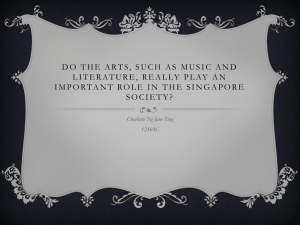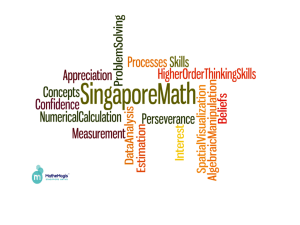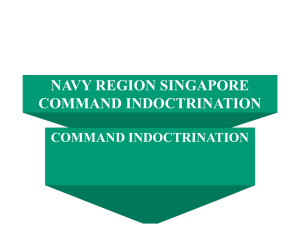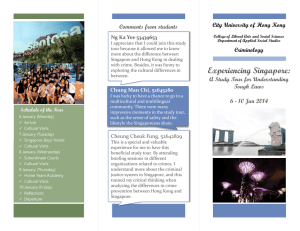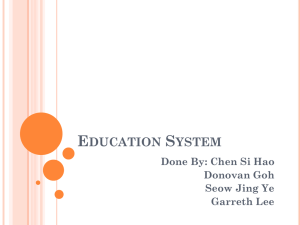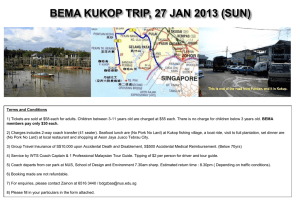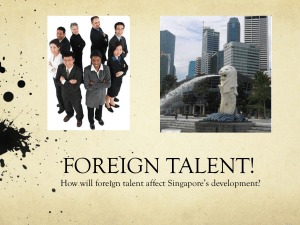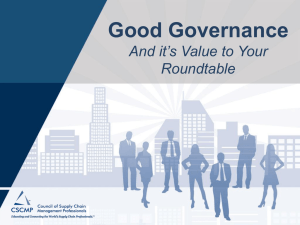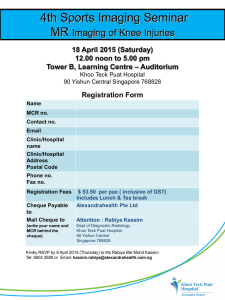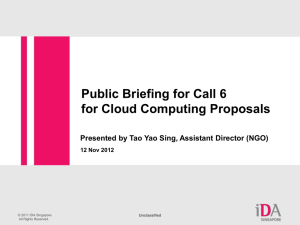Governance in Singapore
advertisement
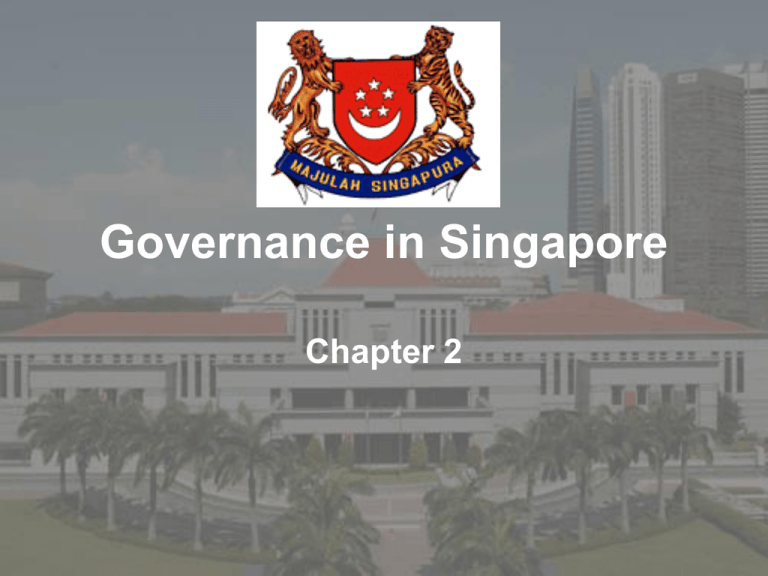
Governance in Singapore Chapter 2 Governance in Singapore • SIOs: At the end of the lesson, you should be able to: – Understand the government structure of Singapore. – Explain the functions of Singapore government. – Explain the guiding principles of Singapore government. – Explain how good governance can be continued into the future. Governance in Singapore Government of Singapore Legislature Executive Judiciary President members of Parliament makes laws President cabinet executes laws judges law courts implements laws The Structure of Singapore Government Governance in Singapore • What is the system of government in Singapore? – Parliamentary democracy • Model after Westminster government system • Government chosen by the people in an election – Held once in every 5 years – Candidate with the majority votes will be elected into the parliament – The leader of the political party with the most number of elected members of parliament will become the Prime Minister » PM will select from elected MPs to form the cabinet Governance in Singapore • The functions / role of government 1. 2. 3. 4. Managing resources of a country Meet the needs of the country Perform specific functions Involving people Governance in Singapore • The functions of the government: – The government decides on POLICIES • to overcome CONSTRAINTS & VULNERABILITIES • So as to achieve – PEACE & PROSPERITY Governance in Singapore • Definition: GOVERNANCE – • The way a government manages resources of a country so as to achieve economic and social development. What are the ways to ensure good governance? The 4 ‘A’s 1. 2. 3. 4. Ability to make sound policies Ability to implement policies effectively Ability to deliver promises Ability to gain citizens’ support Governance in Singapore • What are the guiding principles of governance in Singapore? LARA – Leadership is Key – Anticipate Change and Stay Relevant – Reward for Work and Work for Reward – A Stake for Everyone, Opportunities for All Governance in Singapore • Leadership is Key – Leaders to do what is right rather than what is popular = PRAGMATISM • If government does only what is popular (what people want), they may not have the resources to deal with all the constraints and vulnerabilities • Pragmatism requires courage as it is doing what majority of the people wouldn’t like becoming less popular • e.g. Electronic Road Pricing (ERP) – Pay-as-you-use scheme – Greater equity for motorists – Honesty is also equally important • Make fair distribution of the resources needed for the country to progress • CPIB = Corrupt Practices Investigation Bureau Singaporeans’ views on ERP from a forum. Leadership is Key • Ways to manage traffic flow in Singapore – Land Shortage constraint • Singapore cannot have too many vehicles on the road – Will lead to traffic jams leads to loss of man hours lowering of profits for investors Singapore becoming less popular for foreign investors – Frequent road jams will mean that the transport flow of goods will not be smooth. It’ll take the producers/investors longer period of time to see profit returns source for countries where traffic is smooth – Methods: • • • • Area Licensing Scheme (ALS) – 1975 Electronic Road Pricing – 1998 Vehicle Quota System - Certificate of Entitlement (COE) Park and Ride Scheme ` Structured-Essay Question (SEQ) • ‘The Vehicle Quota System (VQS) is the most important measure in keeping traffic flow smooth in Singapore’. How far do you agree with this statement? Explain your answer. [12m] Governance in Singapore • Choy Hon Tim : the largest total bribe amount in CPIB's history Choy Hon Tim, the former Director of the Electricity Department as well as the Deputy Chief Executive (Operations) of the Public Utilities Board (PUB) may not be the most senior public officer investigated by the Bureau, but his case involved the largest amount of bribes uncovered. He was investigated in 1995 following allegations that he had received kickbacks in return for awarding contracts to suppliers and contractors of PUB when he was a Chief Electrical Engineer of PUB. Choy was subsequently charged for obtaining gratifications totalling $13.85 million. He was convicted and sentenced to 14 years' jail term and the $13.85 million bribe obtained by him was forfeited to the State. Governance in Singapore • Anticipate change and Stay Relevant – Forward-looking • Be able to foresee the developments in the future based on current trends and developments • Take active steps/measures to cope with future developments • E.g. NEWater – Government prepares for alternative sources of water in anticipation of the expiration of our water contracts with Malaysia in 2011 & 2061. – Increases our level of self-reliance and lowers dependence on other countries. – Government prepares our people psychologically to accept the NEWater » Aware of the skepticism of Singaporeans over the quality of it • E.g. Desalination Plants – Too costly Q: Why does the reporter write about the NEWater in this way? Explain your answer Q: Can you believe the source in what it says about NEWater? Explain your answer. Governance in Singapore • Reward for Work and Work for Reward – Meritocracy for the best use of talent – Stress on self-reliance and not welfare – A system which encourage people to work hard as they will be given recognition and rewards • Promotion based on hard work in civil service • Edusave award given based on good academic results • A fair system that is based on equality – Everyone has an equal chance to succeed. • Progress Package in Singapore / Economic Restructuring Shares (ERS) – In this way, the people know that success is highly dependent on their own effort and the government is fair to all. Hence, everyone will strive to work hard which will lead to improved productivity for the country Governance in Singapore • A Stake for Everyone, Opportunities for All – Giving everyone a role to play in the society – decision-making e.g. Building of Integrated Resorts – Giving opportunities for all to realise full potential – This is achieved through: • • • • Making Singapore a global city and a choice home Promote collective responsibility Beyond physical stakes Preserve core values and identity – The citizens will feel a sense of responsibility that they have to contribute due to collective responsibility
